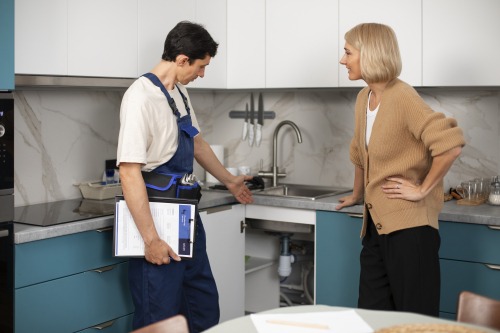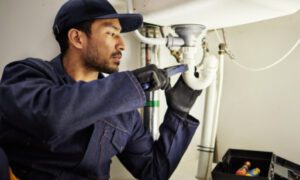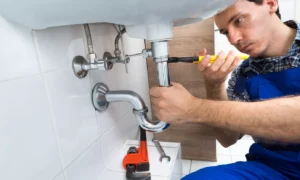Plumbing emergencies don’t wait for regular business hours. Whether it’s a burst pipe at midnight or a clogged sewer line on a holiday weekend, urgent issues can happen when homeowners least expect them. Water-related damage escalates quickly, turning minor problems into expensive repairs if not addressed immediately. That’s why many plumbing companies offer after-hours emergency services, ensuring critical situations are resolved before they cause structural damage, health risks, or significant inconvenience. Responding effectively outside the usual 9-to-5 requires readiness, a clear communication process, and the ability to troubleshoot under pressure—qualities that define how modern plumbers approach late-night calls.
Responding quickly and safely under pressure
- How Emergency Calls Are Received and Prioritized
When a plumbing emergency happens after hours, the process often begins with a homeowner calling a 24/7 hotline or answering service. These systems are designed to filter genuine emergencies from routine service requests, ensuring that available plumbers are dispatched efficiently. Common after-hours emergencies include overflowing toilets, water heater leaks, frozen or burst pipes, and gas line concerns. Once a call is received, the plumber on duty is notified, and they typically call the customer back within minutes to ask a few questions and gauge the severity of the issue. This allows them to prepare the necessary tools, parts, and safety equipment before arriving. An emergency plumber in Lewisville often keeps a stocked vehicle for rapid response, so they can handle most urgent repairs without needing to return to a warehouse or supplier. Quick, clear communication during the initial call sets the stage for timely arrival and effective resolution.
- Initial Assessment Upon Arrival
Once on site, the plumber conducts a swift but thorough assessment of the situation. After-hours emergencies often involve fast-moving water, so the first step is usually to stop the source, shut off the main valve, or isolate the faulty component. The plumber then inspects the surrounding areas to ensure no additional systems are compromised. For example, a leaking water heater might have affected nearby electrical wiring or caused floor damage. Since lighting and visibility can be limited at night, portable lamps and head-mounted lights are used to perform inspections safely. The goal is to stabilize the issue quickly and determine whether a temporary or full repair can be completed during the visit. Some situations may require follow-up during regular hours if parts are unavailable, but emergency plumbers always aim to leave the property safe and secure before they depart. A clear explanation of what happened and what steps were taken helps homeowners understand their next move.
- Balancing Repairs with Safety Protocols
Working outside of standard hours adds a layer of complexity to safety protocols. Emergency plumbers often work alone, especially during overnight shifts, which makes cautious decision-making critical. They follow strict procedures for entering and exiting properties, handling pressurized systems, and managing tools in dark or confined spaces. They wear personal protective equipment for gas leaks or sewage backups and ensure proper ventilation or evacuation. Communication remains a priority throughout the process, and plumbers often update dispatchers or supervisors about their progress, especially for complicated calls. The safety of both the technician and the occupants is never compromised. Even in urgent scenarios, the plumber must slow down enough to make safe and lasting repairs rather than rushing through fixes that might fail later. This balance of urgency and care defines how plumbing professionals work effectively in challenging after-hours conditions.
- Customer Communication and Temporary Solutions
Sometimes, a permanent fix isn’t possible during the initial visit, especially if the issue involves rare parts or larger structural problems. In such cases, plumbers communicate openly with homeowners about the temporary measures in place and what steps will follow. They may cap off broken pipes, seal leaks, or shut down systems to prevent further damage. Detailed documentation is left behind, often including photos and written summaries of what was done and why. Customers are reassured through transparent communication and given estimates for additional repairs during regular business hours. This process helps reduce anxiety in what is often a very stressful moment. The plumber also advises on precautions homeowners should take, such as keeping an area dry, avoiding water use in specific fixtures, or checking for unusual odors or noises. Even if the issue isn’t resolved at 2 a.m., the situation is contained and the next steps are clearly outlined.
- Maintaining Readiness Through On-Call Rotations
Plumbing companies often rotate on-call shifts among their team to ensure prompt after-hours service. This system spreads the workload and ensures no single technician is overburdened. Plumbers who take on overnight or weekend duties typically prepare ahead of time by checking their inventory, refueling vehicles, and reviewing procedures for less common emergencies. This preparation is key to keeping response times short and resolutions efficient. Some companies invest in mobile diagnostics and smart tools that help detect leaks or blockages quickly, further improving efficiency. Although it requires personal sacrifices and late-night wake-ups, many plumbers view emergency service as a rewarding part of their job. Helping a family avoid major water damage or restoring hot water to a home on a freezing night provides a strong sense of accomplishment and service. This commitment to readiness reflects the industry’s dedication to solving problems whenever they arise.
Always Prepared to Answer the Call
Plumbers who handle emergency calls after hours offer more than technical skill—they deliver peace of mind during moments of uncertainty. Rapid response, safe assessments, clear communication, and reliable temporary solutions ensure that homes stay protected even when trouble strikes at inconvenient times. These professionals operate with discipline, adaptability, and a strong sense of responsibility. Their ability to work effectively in high-pressure, unpredictable conditions makes a meaningful difference in people’s lives. As homes become more complex and homeowners rely on around-the-clock service, the role of emergency plumbers continues to grow in both importance and value. Their quiet, unseen work after dark ensures that when water flows where it shouldn’t, someone is always ready to shut it down and make things right again.

































